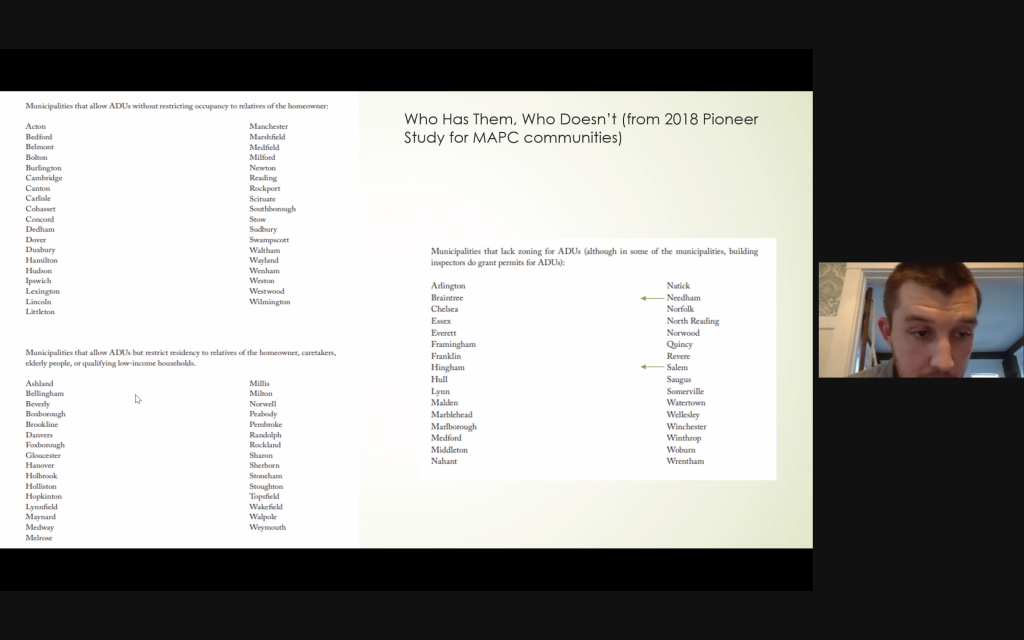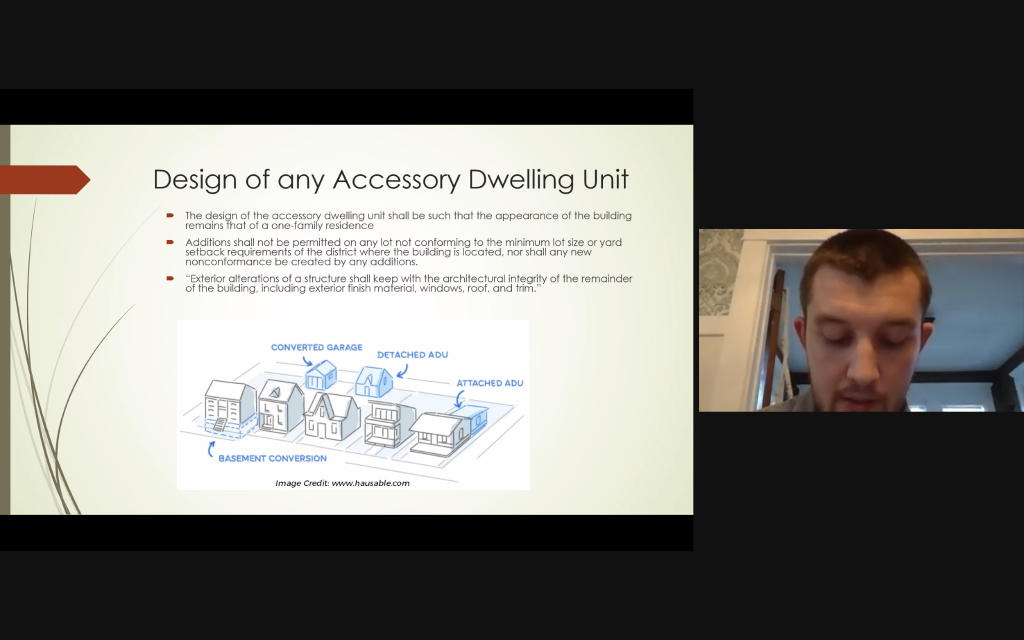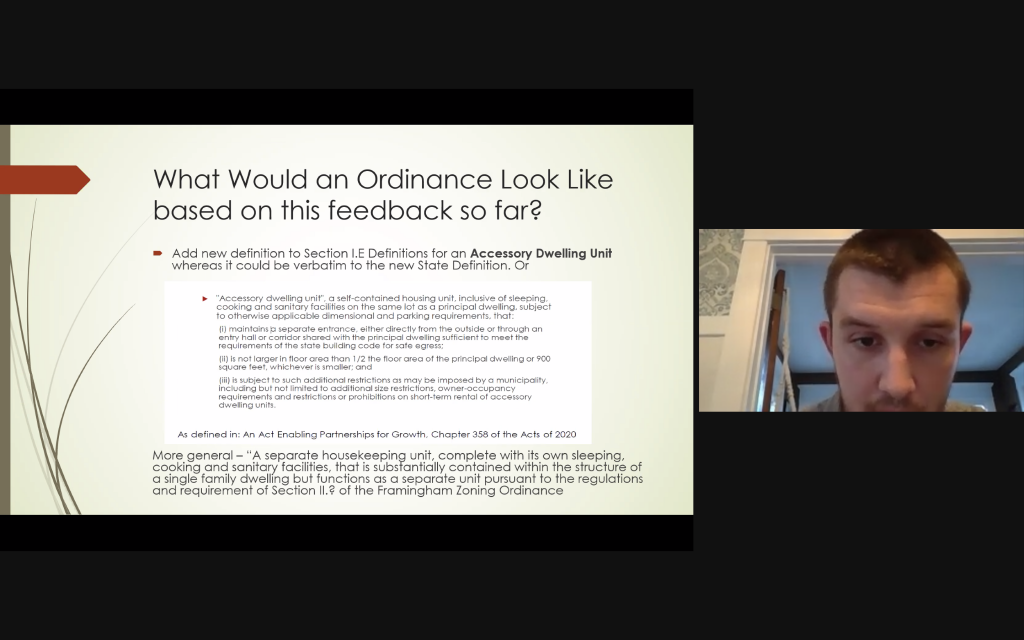By Grace Mayer
***
[broadstreet zone=”51611″]
FRAMINGHAM – The Framingham Planning Board met Thursday night, June 24, to hear from residents on an proposed ordinance that would allow in-law apartments to be built in neighborhoods, and home renovations to accommodate for elderly and family members with disabilities, and their caretakers.
“It’s the elderly and the disabled who are the most vulnerable in our communities who need to be cared for within an arm’s reach of their family,” said Kathy Paquette, a Framingham resident for 25 years and an employee with Autism Alliance.
Paquette, who has a nearly 25-year-old disabled son, said an accessory dwelling unit (ADU), also known as an in-law apartment, would allow her son to stay close to home with a caretaker.
But not all residents in Framingham are supportive of amending current zoning restrictions which largely prohibit the accessory dwelling units (ADU).
[broadstreet zone=”59984″]
The meeting was held to “take a temperature,” of resident’s opinions on the proposal, said Framingham Planning Board Chair Kristina Johnson.
The ordinance, which is still in a draft stage before it will be submitted for review by the City Council, has raised resident’s concerns about fire safety, overcrowding in neighborhoods, and residents profiting by turning the units into “illegal apartments,” Framingham Planning Board Chair Kristina Johnson said.
“This is really about allowing members of our community to age in place, to take care of maybe sick family members or a member of the family who may have a disability,” said Chair Johnson. “This is really not about allowing for apartments.”
A survey distributed by Framingham’s Planning & Community Development board consisted of 186 responses from Framingham residents that showed the city was split on the matter.
The respondents were largely in favor of ADUs, with over 77% of respondents saying they believed ADUs should be allowed in all zoning districts in Framingham and close to 12% saying that ADUs should never be allowed.
But when asked about the process to gain permits for ADUs, the size and location restrictions for ADUs, and additional parking, responses were divided.
Whether the ordinance is approved will impact the future of families in Framingham, like Paquette’s.

Paquette said she personally wants to have an ADU installed in her home’s basement for her son, where he would be close to care while maintaining autonomy. Without it, Paquette said her family would have to consider government housing—where she’s concerned about underfunding, limited availability, and the potential for resident abuse.
“Why can’t he stay in a neighborhood where everyone embraces him, loves him, we feel safe with him, and we don’t have to worry about all the abuses out there?” Paquette said.
But many residents are still left with questions and concerns about the potential challenges that could stem from allowing for ADUs to be built.
Sean Silk, a District 2 Framingham resident, said he is against the implementation of ADUs, and referred to cases of zoning laws in Framingham’s Central Business district being overturned because of overcrowding—which he believes will happen if ADUs are allowed in neighborhoods. Silk said that overcrowding in neighborhoods could also create traffic issues and fire concerns.
“This problem exists right now for us where we allowed changes in zoning which led to overcrowding and abuse,” Silk said.
[broadstreet zone=”59983″]
District 6 Framingham resident Kathie McCarthy said she doesn’t believe ADUs are necessary, in part because family members don’t need an additional kitchen, which an ADU would provide.
“Those of us who have helped our family members and taken care of them as they age or for whatever reason have done this successfully without [ADUs],” McCarthy said.
While Framingham residents are still divided on the issue, other cities & towns in Massachusetts have approved ADUs.
Nearly 70 communities in Massachusetts allow ADUs, based on a 2018 study from the Metropolitan Area Planning Community.
Since at least 2014, Senior Planner for Planning & Community Development Shane O’Brien said, the City’s Master Plan cited a goal of allowing ADUs to be created in single-family homes.
In 2020, the city’s Master Plan once again included a goal to improve housing by allowing ADUs. Zoning laws were never changed.
Although ordinances for ADUs have been rejected in the past, District 4 Councilor Michael Cannon, who initially proposed the ordinance in 2018, believes weighing the community’s concerns will help Framingham get one step closer to legalizing ADUs. He re-submitted a new ordinance this year.
“I also believe that just because a solution couldn’t or wasn’t found in the past, that we shouldn’t endeavor to find a solution today,” Councilor Cannon said.
Under the City’s current zoning laws, in-law apartments are technically banned, unless through a special permit in certain districts only.
[broadstreet zone=”59946″]
***
Grace Mayer is a senior at Boston College studying marketing and journalism. She is also the head arts editor for Boston College’s newspaper, The Heights, where she’s covered the arts beat for three years. She is excited to report on a variety of beats for Framingham SOURCE this summer. You can contact her at gemayer007@gmail.com.
***






